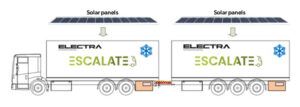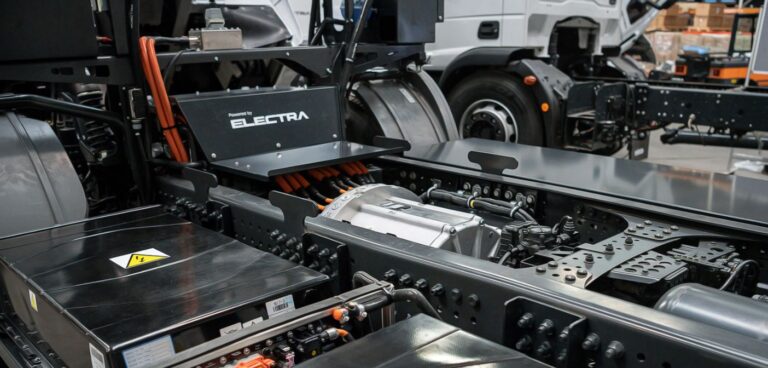A consortium called Escalate, with 37 members from 13 different countries around Europe is working to develop and build a number of pilot vehicles for a project aimed at producing the next generation of heavy goods vehicles (HGVs).
Five pilot vehicles are due to be built over the next three years as part of this €19 million project. One of these pilot vehicles is being built by Blackburn-based commercial vehicle manufacturer Electra.
Electra recently won funding from the Horizon Europe 2022 framework to build ‘a 40-tonne drawbar battery electric vehicle (BEV) capable of achieving 800km on a single charge’. Horizon Europe is an EU funding programme providing grants to research and innovation projects seeking to tackle issues like climate change.
The Lancashire firm says that it will use the chassis of one of its existing models, the eStar LEM27-350, as a starting point for the new truck – which will feature a drawbar trailer, ‘energy efficient’ refrigerated systems, and lightweight solar panels (as pictured below).

In addition, digital twin technology will be used to ‘speed up the testing and verification process’. Digital twins are increasingly being used by major companies like Mercedes-Benz to run simulations and track operational efficiency.
Ben Smith, Managing Director of Electra Commercial Vehicles said: “We are very excited to be involved with this project while working with multiple new companies. The ground-breaking technology they will bring to the vehicle will shape a new chapter in Electra’s story.
“We are eager to showcase our industry-leading capability to design and integrate components into heavy-duty long-haul trucks. This project will be the perfect platform to demonstrate our skills and expertise in delivering sustainable zero-emission propulsion solutions.”
As reported by Logistics Manager earlier this week, battery electric vehicles only accounted for 0.2% of HGVs and 0.9% of light commercial vehicles (LCVs) licensed for use on UK roads in Q3 2022, according to data from the Department for Transport (DfT) and the Driver and Vehicle Licensing Agency (DVLA).
HGVs have proved more of a challenge in terms of electrification when compared to cars, for example. Speaking as part of a panel discussion attended by Logistics Manager at CBRE’s EV Event in May, Consultant Fleet Director at ChargePoint Simon King noted the “huge amount of progress” being made for HGVs when it comes to electrification and emissions reductions. He acknowledged the difficulty of this task but remained optimistic, saying: “There’s a lot to do there, but it’s not unsolvable”.
Once built, Electra’s pilot vehicle will be demonstrated in the UK and Germany.







